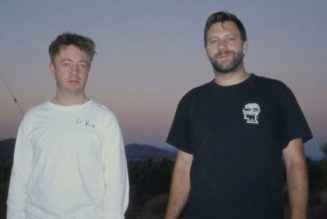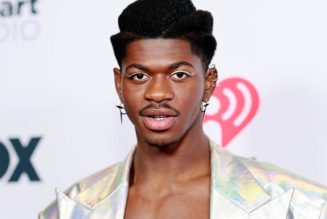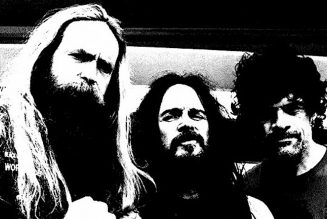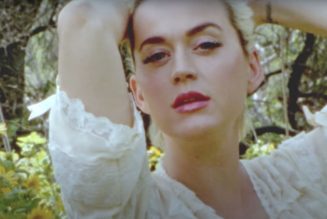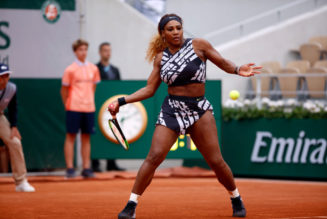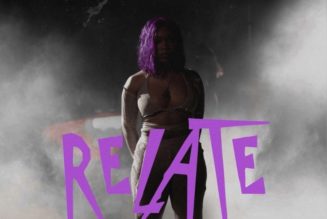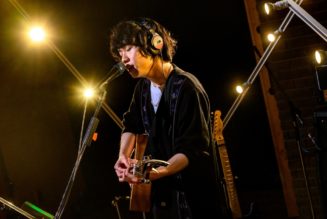Taken from the summer 2024 issue of Dazed. You can buy a copy of our latest issue here.
Good Friday, a time typically reserved for church, food, friends and family. In secular circles, it’s often observed through rest, light socialising and other leisurely activities. For the musician born Tyla Laura Seethal, however, this year the pressure is on. Minutes away from an untypically tranquil Shoreditch High Street, a cluster of over 30 people – male models in crisp black blazers, assistants attending to their boss’s needs, make-up artists adjusting and reapplying lash extensions – flutter across a photo studio in preparation for South African music prodigy Tyla’s first Dazed cover shoot. At the top of the star’s eponymous debut album release week, she is due at Heathrow at 7pm for a flight to South Africa. A homecoming awaits.
As the room quietens, the clock closes in on 5:30pm. To her manager’s annoyance, there are calls for “one last look”. We are technically done, but Dazed editor-in-chief Ibrahim Kamara and photographer Hugo Comte squeeze a few more seconds in, long enough to try out one more look. Luckily, dexterity isn’t something Tyla has had to learn recently – it’s innate. It’s how she informs decisions and it has come to define her as she emerges onto the world stage as perhaps the first true star of amapiano, South Africa’s irresistible spin on house and kwaito music styles.
Tyla is visibly exhausted by the time they finally wrap. Finishing the day in a luminous tracksuit, her signature cornrows beam hard under the studio lights, in stark contrast to the black pixie cut they’ve been hidden under for most of the day. Marvelling at hair stylist Virginie Moreira’s custom wig, she shares that it’s one of the first times she has had her hair fashioned this way – it suits her. Tyla runs on a seemingly endless supply of adrenaline that has, so far, helped her maintain a schedule of back-to-back interviews, shows across three continents and the daily updating of her social media channels.
“She’s a perfectionist,” Thato, her creative director and best friend of over a decade, tells me on set. “She’s hard-working too. That combination has been lethal over the years.” Throughout the shoot, Thato is waved over to triple-check details like clothing placements. “I can feel her confidence and assuredness growing. It’s as if she’s become a woman [through] this album process. She’ll make that extra effort to get it right.”

Marvin wears viscose blazer DRIES VAN NOTEN, cotton shirt THOMAS PINK, polyester and wool trousers GUCCI (all worn throughout). Jeffrey wears all clothes and tie as before, steel and leather watch OMEGA. Ronald wears all clothes and accessories as before.Photography Hugo Comte, Styling Ib Kamara
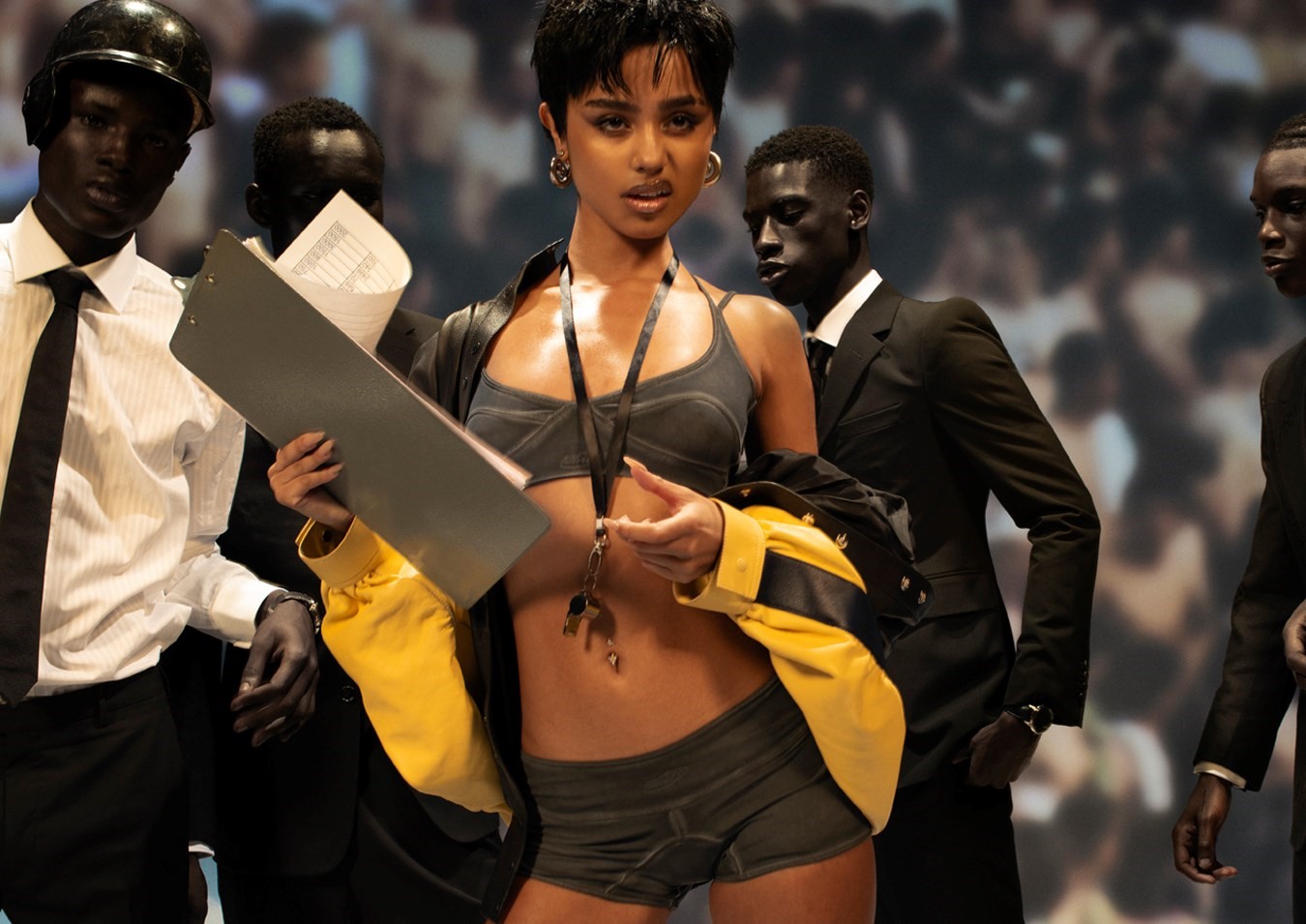
Marvin wears viscose blazer DRIES VAN NOTEN, cotton shirt THOMAS PINK, polyester and wool trousers GUCCI (all worn throughout). Jeffrey wears all clothes and tie as before, steel and leather watch OMEGA. Ronald wears all clothes and accessories as before.Photography Hugo Comte, Styling Ib Kamara
“Water”, her debut single, filtered into ears everywhere last year, dominating 2023’s third and fourth quarters after amassing top ten positions on home turf, in the US and in many European markets. Its magnetism lies in its lyrical hooks, Tyla explicit in her demands to make her sweat and lose her breath atop hypnotic synths and entrancing log drums. “I always want to be authentic to myself,” she says. “When I make music and speak on mature things, this is how it comes out, this is how I express it.” Tyla has a penchant for innuendo, and doesn’t take to songs that are too on-the-nose. “I think it’s cool when people find out [what I mean] along the way, I enjoy music that’s deeper [where] you need to dissect it to find out what’s really happening.” Tyla’s coyness is informed by her childhood in Johannesburg. As is customary in many South African households, she was never allowed to swear or watch people kiss on TV growing up – “It’s not very comfortable for African parents and kids to watch TV together, and I’m not able to be that open about things like cussing,” she says of her relationship with her family. “It doesn’t feel like Tyla.”
“Water” taking off was not something that Tyla was mentally ready for, and its phenomenal success meant the team around her had to quickly realign. “We were low-key scrambling,” she says with a laugh. “I was like, ‘How am I gonna let people know my name?’ I never want it to be the case where the song is huge and people don’t know who I am.” Sammy SoSo, “Water”’s producer, remembers the moment the song really took off – he was inundated with calls on the day his daughter was born last September. “Tyla had changed the [song’s dance] routine with her choreographer for a performance in Rwanda [where] she poured water on herself,” says SoSo of the clip, which quickly went viral on TikTok. “Everything changed.” I’m reminded of a widely shared video of Nigerian football fans pouring water on themselves at a game against a South African side in February, in reference to the hit.
“I love seeing women dominating and being the face of Africa… it’s about giving more examples to young girls at home, and showing them we can also run this thing”
Whether it’s dancing bacardi, lifting from her home region’s musical styles or infusing moves from her choreographer, Lee-ché Janecke, Tyla brings South Africa wherever she goes. It’s something she refuses to negotiate on. “I’m so proud we get to do this as a South African team,” she says on set. Amapiano has benefitted from the global reach that social media offers, especially now musicians are able to network and collaborate relatively effortlessly. Just like Tyla, the genre’s major names, from Uncle Waffles to Kabza De Small, have enjoyed successes well outside of the country’s borders.
The sound of amapiano shocked Tyla when she was introduced to it at 14. Familiar with the tempos and sounds in passing, she, Thato and others first heard Kwiish SA’s viral tune “Iskhathi (Gong Gong)” during a free school period. “That song, that log drum… It’s insane,” she says. “Hearing it in speakers and at parties I knew that the way it made me feel, [amapiano] had to be bigger than this.” Tyla had always wanted to be a music star. Videos of her singing Justin Bieber at 11 years old lie deep on YouTube to this day, but her infatuation with “Gong Gong” prompted a full embrace of amapiano and, eventually, her own amalgamation of the genre.
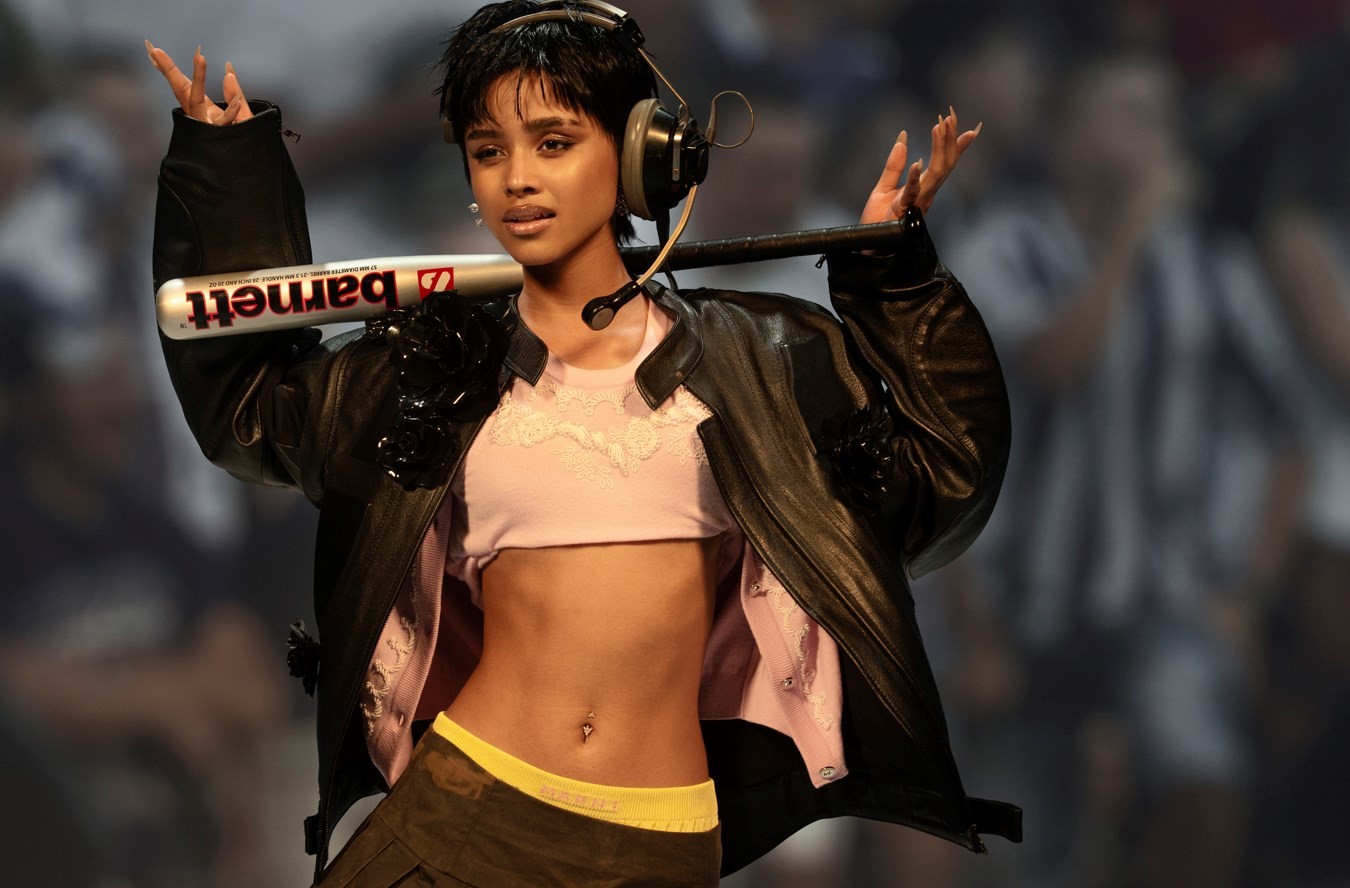

Her first dalliance was a relatively throwaway three-minute pop number, and it wasn’t until 2019’s “Getting Late” that Tyla experienced her first taste of virality, culminating in a debate on socials around Tyla’s place in the amapiano scene. In hindsight, it was an early indication that she was doing something different. “There weren’t people singing on amapiano at the time,” she recalls, “just longer songs, around seven minutes with chants.” The song sparked a wave of makeshift monikers and sonic descriptors from amapiano enthusiasts online. “‘This is cool, but this isn’t really amapiano, it’s popiano,’” Tyla recalls one of the comments saying. The song pricked the ears of Epic Records president Ezekiel Lewis, who signed her to the imprint in 2021. “I call her the most precious African export,” declares Lewis. “She’s a vehicle; she’s bringing palatable forms of music from the continent to global audiences.”
After signing her, Lewis spent some time in a locked-down Dubai with the singer to hone her sound. “I had to pick a place on Earth where people from America, South Africa and the UK could go that wasn’t banned,” he says. Inaugural recording sessions included contributions from the likes of Tricky Stewart, will.i.am and Native Beats. “It was during these sessions that I realised the [general] recording experience was an area to help Tyla adjust into.”
“There weren’t people singing on amapiano at the time… [people were like,] ‘this is cool, but this isn’t really amapiano, it’s popiano”
Development and experimentation continued in Cape Town, Los Angeles, Miami and Atlanta, with sessions in the Georgia capital birthing early iterations of “Water” and “Safer”. A group she calls the “fantastic four”, comprising Ari PenSmith, Sammy SoSo, Corey Keay and “Mocha” (Imani Lewis), all guest on TYLA. “I’ve worked with so many people along the way,” says Tyla, acknowledging the work that’s gone into the LP. “But the team that I’ve landed on, I feel like they get me, they bring a lot out of me. They help me to realise that this is all OK.” Broadly, the ‘fantastic four’ homed in on the winning formulas in her arrangements, utilising Tyla’s broad array of musical references. “If you like amapiano, you’ll hear something in her records that you’ll like; if you like R&B, you’ll hear something you will like. It’s a bit of everything,” says Lewis of the approach, noting “Water”’s R&B toplines, log-drum foundations and Afrobeats sonics.
Tyla’s debut album is in service to her ancestry, and a gesture towards pop’s future. The balm found in the elongated and soothed melodies of “Truth or Dare” or “Breathe Me” is in sharp contrast to the ominous, foreboding basslines of “Jump”, its panning saxophone parps winking at Skillibeng’s dancehall-infused vocals. Even with its genre-hopping palette of sounds drawn from Europe, the US and South Africa, Tyla’s album was criticised in some quarters online for a perceived lack of sonic diversity. “Even though Afrobeats is huge and amapiano is big, it’s still new to a lot of audiences,” Tyla reasons. “[These genres] may sound ‘similar’ because people may say it, but I encourage them to listen to the roots, where my sound originated from. Scorpion Kings, Kabza De Small, Wizkid, Burna Boy – they understand the culture, they understand the genre. The people who are saying it aren’t in that world.”
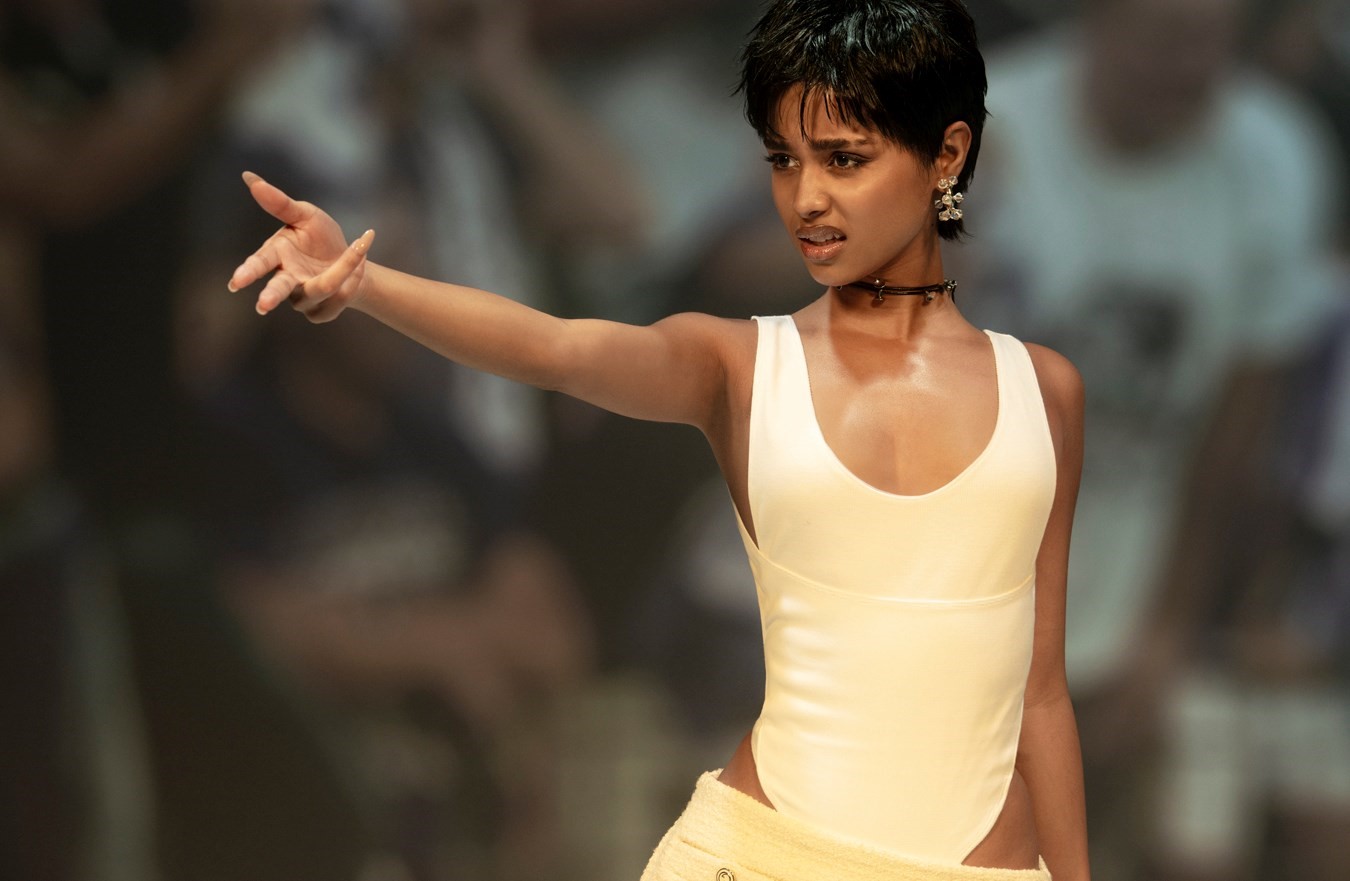
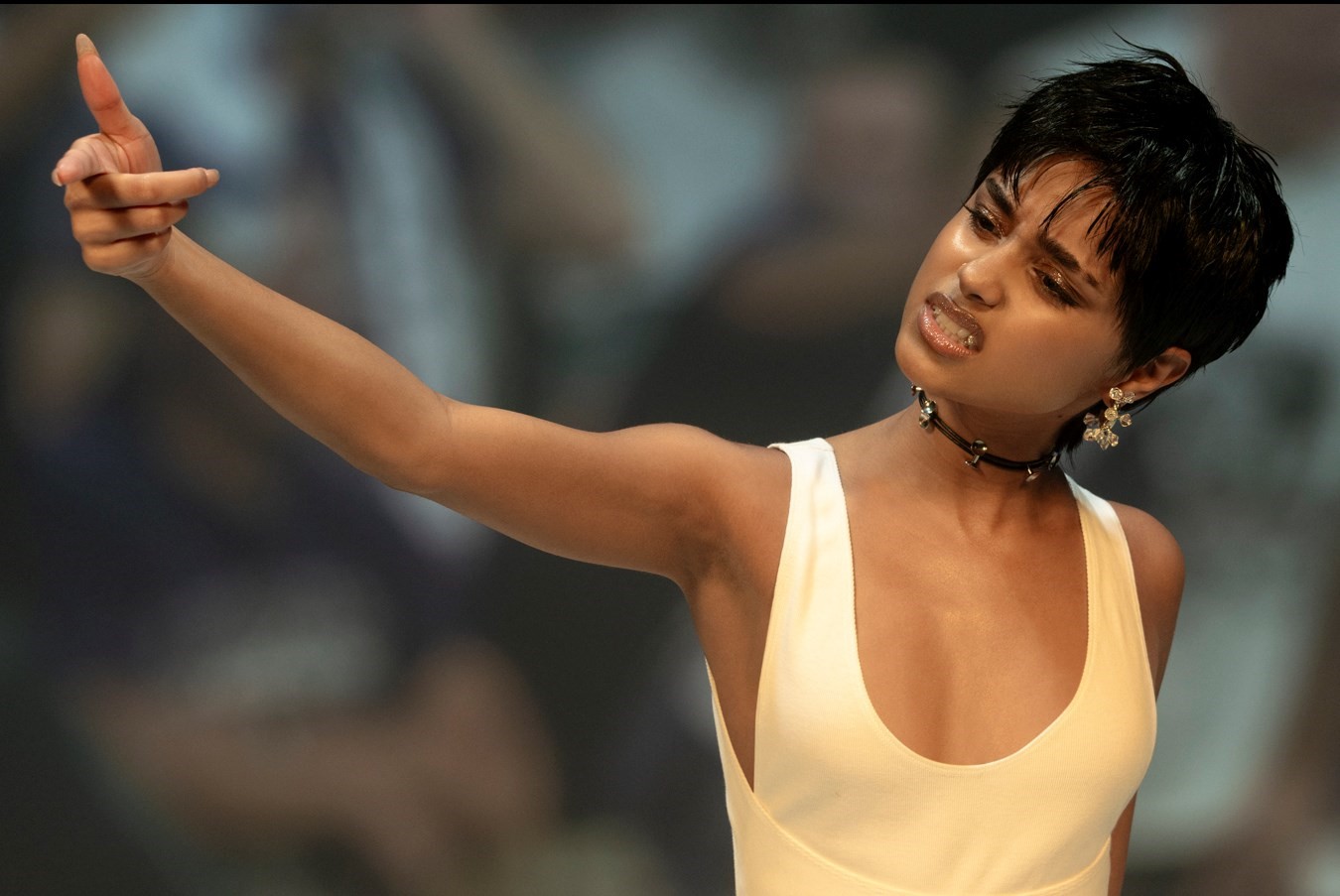
Similar accusations have been levelled at other west African acts including Wizkid and Tems recently. For Tyla, it is symptomatic of a world still trying to place, understand and archive music from the continent. In February this year, the Grammys debuted a new genre category, best African artist, for which Tyla’s “Water” received its maiden trophy. There are claims that the new category prioritised only a limited number of sonic styles. During her acceptance speech, Tyla seemed characteristically unfazed, thanking God and reflecting on her luck. “I know I’m forgetting something, but I just won a Grammy,” she smiled on the night.
Nestled in Tyla’s warmth is a certain mystique. Though sometimes short with answers, she is open about the musical journey she embarked on for TYLA. “It’s OK to let people know what’s happening,” she begins of her process. “The way [my vulnerabilities] turned out, it was too beautiful not to share.”
Listening to album opener “Safer”, you’d never anticipate Tyla’s shyness in real life. “[Vulnerability] helps Tygers [Tyla fans] know how to express themselves; you want people to connect with you. [Because] really the goal is not to become famous, it’s not to become a pop star, it’s to make an impact in music and in people’s lives.”
The music video for “Water” recalls the sweltering 00s set of Britney Spears’ “I’m a Slave 4 U” – a reference that frequently dotted news pieces on the video when it dropped, to Tyla’s dismay. “Honestly, when people bring up these references, most of the time there was never a reference,” she retorts. “It’s never, ‘Make the video look completely like this.’ It’s getting boring now.” Having spent so much energy on the choreography of her music videos and live shows, it’s no wonder she gets a little prickly when all journalists want to comment on is the past. “We have so many cool things of this time, new creatives. I just love working with people who have new and fresh ideas,” she says, citing cinematographer Frank Mobilio, who imposed a blanket storyboards and references ban to the “Water” video. “If you’re dancing and sweating, you’re doing too much,” Tyla observes astutely of the choreography. “Even the dances that we come up with, it’s literally random people who just did something they felt in the moment which just caught on and now the world is doing it.”
“The goal is not to become famous, it’s not to become a pop star, it’s to make an impact in music and in people’s lives”
After cancelling a show in March due to an injury, Tyla revealed that she’d been silently suffering with it for a year. When I ask her about the injury she pushes back, politely refusing to talk about it in depth. It’s only weeks later, on Zoom, that she cautiously addresses the subject, exactly 48 hours after her first post-injury performance. (Though she was less racy in her eight-counts and relentless circuits across the stage, Tyla still managed to conquer it with authority.) “I’m still listening to my body,” she says. “I think I need to take my time, not rush. I want to give people art and good performances, but I need to listen to my body and what I need.” Endurance to Tyla, it seems, isn’t just about how hard to push yourself, but knowing when to slow down for the greater good. When to take the hard shoulder and practise caution.
Back on set, Tyla’s energy is infectious. A playlist of tunes confirming Africa as the centre of the pop universe right now soundtracks the shoot. As Rema’s “Don’t Leave” blares on set, Tyla is seen rolling her waist and gesturing to Thato, filled with liberation. “I love seeing women dominating and being the face of Africa,” she says, nodding to features from the likes of Ayra Starr and Tems on TYLA. “It’s about giving more examples to young girls at home, showing them that we can be bosses, and we can also run this thing. We’re equally as deserving, we deserve a place at the table too.”
Hair VIRGINIE MOREIRA at MA+ TALENT, make-up ISAMAYA FFRENCH at ART + COMMERCE using ISAMAYA BEAUTY, nails LAUREN MICHELLE PIRES at FUTURE REP, models JEFFREY OBED and MARVIN ADDAE at SELECT, RONALD DADEY at WILHELMINA, MICHAEL SHERIFF at THE MILK, GABRIEL NHIAL at PRM, set design IBBY NJOYA at NEW SCHOOL REPRESENTS, photographic assistants REMI PROCUREUR, DIEGO LAGO, BASTIAN KNAPP , styling assistants ANDRA-AMELIA BUHAI, LEA ZÖLLER, SAM THAPA, JENSON KAY POLLEY, hair assistant SHAHIYAN MASON, make-up assistants NATASHA SULTANA, ERIKA FREEDMAN, JOE BROOKS, nails assistant MEGAN CUMMINGS, set design assistants AXEL DRURY, TOBY BROUGHTON, production CAROLE CIEUTAT at 360PM, on-set production CHLOE ACKERS, casting MISCHA NOTCUTT at 11CASTING, casting assistant OPHELIA HORTON


